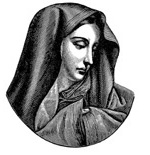
The Davidic Typological Basis for the Dogma of the Assumption
LONG LIVE THE QUEEN MOTHER
Ed. Note: The Feast of the Assumption is on Aug. 15.
The Catholic Church professes four Marian dogmas: the Immaculate Conception; our Lady’s role as the Theotokos, or God-bearer; her perpetual virginity; and her Assumption into Heaven. The first three of these dogmas can be inferred from various scriptural authorities in a relatively straightforward manner. The Assumption of the Blessed Virgin Mary, however, is the only one of these four dogmas that has no obvious biblical support and, for that matter, no obvious witness among the earliest Church Fathers. The dogma — we remind ourselves as we begin — consists of the belief that “the Immaculate Virgin, preserved free from all stain of original sin, when the course of her earthly life was finished, was taken up body and soul into heavenly glory, and exalted by the Lord as Queen over all things” (Catechism of the Catholic Church, no. 966).
One would expect to find at least some circumstantial evidence in the New Testament for the Assumption, but this dogma seems to lack anything like a set of biblical “proof texts” or readily discernible theological principles from which it can be inferred. The Assumption is nowhere explicitly described or mentioned in the New Testament; it is not even recorded in non-canonical gospels or the writings of the Apostolic Fathers. It is confirmed only by later Church Fathers who, by and large, agree on the fact that the Virgin Mary was assumed but do not agree on how or whether she died. Consequently, the dogma of the Assumption looks as if it were solely warranted by non-scriptural, partially conflicting Church authorities, and late authorities at that.
Such a view is mistaken.
You May Also Enjoy
A review of Why Priests?: A Failed Tradition
Parents experience great grief when they do not have the moral assurance of the salvation of their unbaptized children.
Abraham Woodhead interpreted Apocalypse 9 as predicting a sudden invasion of Christendom by a horde of violent and unnaturally lustful insects.

